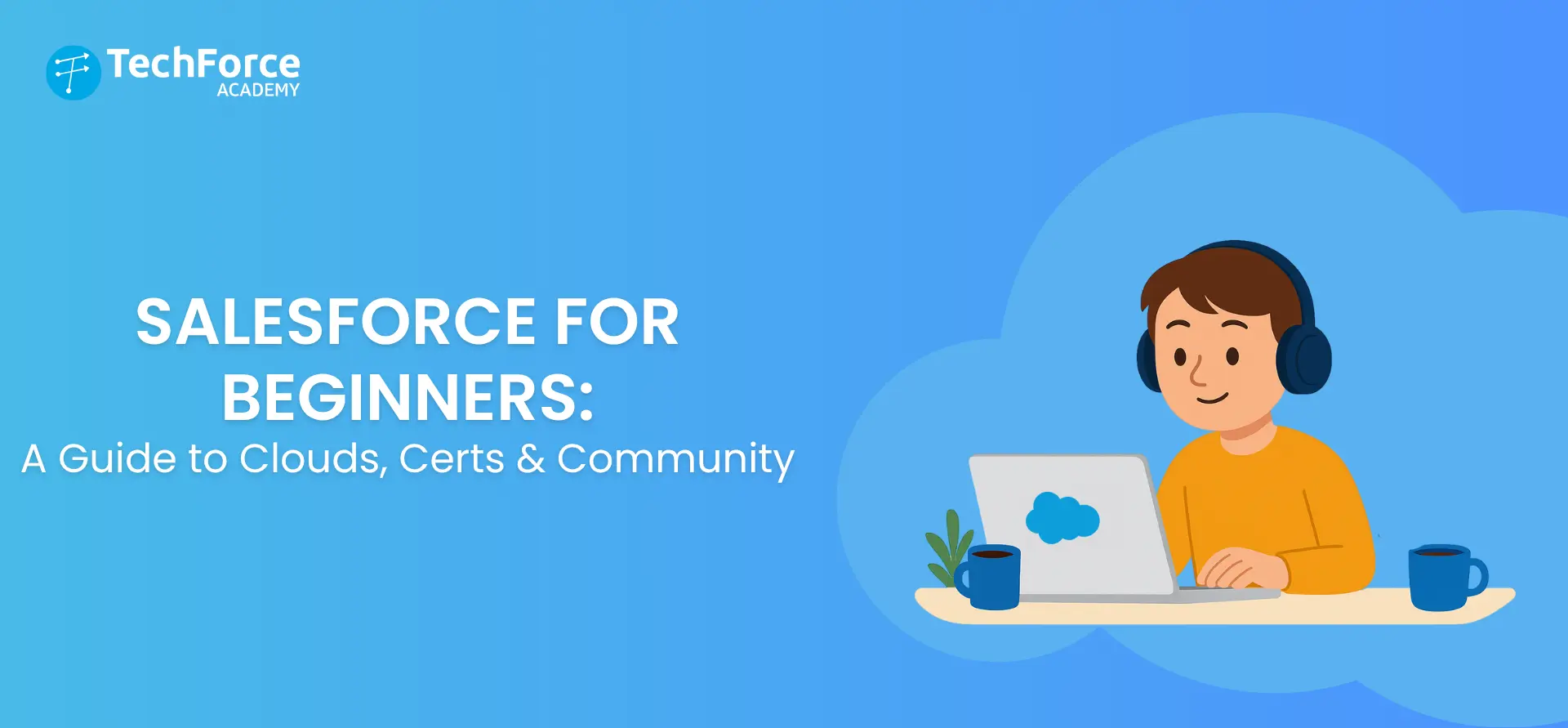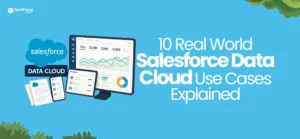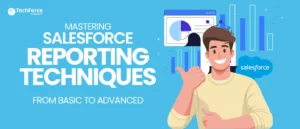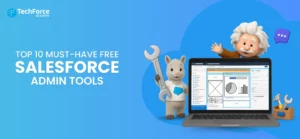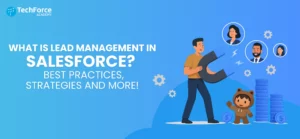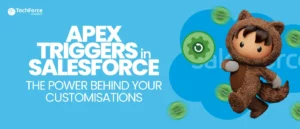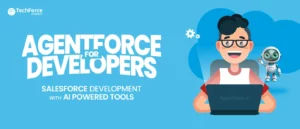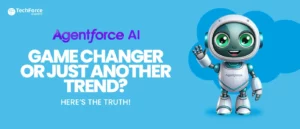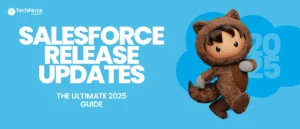The world of the Salesforce ecosystem is huge and growing snappily. This world is full of opportunities where you can learn, grow, and build a career. Whether you are a beginner, a business owner, or just curious about Salesforce customer relationship management (CRM) and business technology, this guide is for you.
This Salesforce for beginners guide will help you understand the platform and explore the different ways you can succeed in this exciting field.
In this guide, you will learn:
- Key tools (like Trailhead and Clouds)
- How to join the community
- Career paths and certifications
- Mistakes to avoid as a beginner
What Is Salesforce? A Quick Introduction
Salesforce is a customer relationship management (CRM) platform that runs on the cloud. It helps businesses manage customer data, track sales, support clients, and work smarter. The platform brings together tools for sales, marketing, support, and commerce—all in one place.
Over 150,000 businesses of all sizes and industries use Salesforce to improve customer experiences, automate tasks, and make smarter decisions with data.
Salesforce Words You Need to Know (Small glossary for absolute beginners)
Before you start, it’s important to understand some basic Salesforce words:
- Object: Data storage space, such as a database table
- Field: A single piece of information, like a column in a table
- Record: One row of data in an object
- Profile: Manages a user’s Salesforce permissions
- Role: Decides what data a user can see
- Permission Set: Extra access given to users when needed
- Validation Rule: Checks that the data entered is correct
- Apex: The coding language used in Salesforce
- Sandbox: Safe practice area
- SOQL: Language to search data
- Flow: A Tool to automate tasks
Now, let’s explore the key parts:
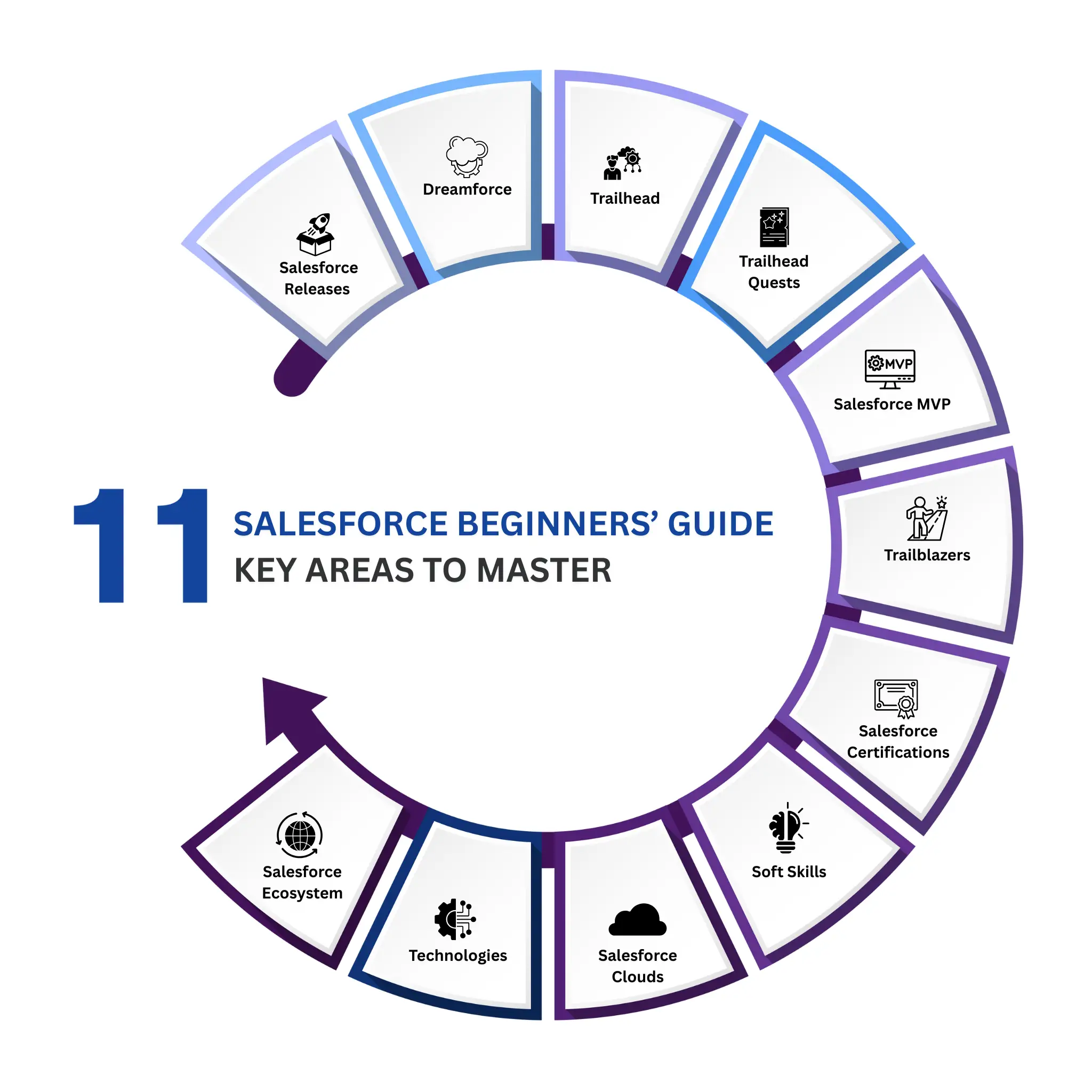
1. Salesforce Releases: New Features Every Season
Salesforce releases updates three times a year, in the spring, summer, and winter, and it is expanding rapidly. These updates are called Salesforce releases. They help the platform grow. Each release gives you:
- New features and tools
- Fixes for bugs and performance issues
- Product updates to improve your Salesforce experience
Every release comes with its own Release Notes that explain what’s new. Some features turn on automatically, but others need setup. Reading the notes helps you get the most out of each release.
Tip: Use a sandbox to test new features first so you don’t risk problems in your live system.
2. Dreamforce: The Top Salesforce Experience
Dreamforce is Salesforce’s biggest yearly event. It welcomes over 180,000 people, both in person and online. It’s a great learning opportunity—especially for those beginning with Salesforce CRM. At Dreamforce, you can:
- Watch keynotes from Salesforce leaders and tech experts
- Join hands-on training and certification workshops
- Network with Salesforce partners and professionals
New to Salesforce? This makes it one of the greatest places to explore. You’ll learn what’s possible and see Salesforce tools in action. Even if you can’t attend in person, Dreamforce On-Demand lets you stream content and stay updated with product launches and sessions.
3. Trailhead: Learn Salesforce the Easy Way
Trailhead is Salesforce’s free online learning platform. Whether you’re new or experienced, it offers interactive lessons that help you build your skills step-by-step. It’s ideal for learning Salesforce basics for beginners. You’ll find:
- Trails: Guided paths for different topics
- Modules: Quick lessons that explain key tools
- Projects: Hands-on challenges that teach real-world skills
The reason Trailhead is a great answer to the question, “Is Salesforce easy to learn for beginners?”—because it makes learning simple, fun, and flexible. You can earn badges as you complete modules and track your progress along the way.
Get Real Practice (For Free!)
You can practice your Salesforce skills for free. Use tools like Trailhead and free practice exams to test your knowledge and get hands-on experience. This helps you prepare for certification exams and real jobs.
4. Trailhead Quests: Compete While You Learn
To make learning even more fun, Salesforce offers Trailhead Quests—interactive challenges where you solve problems and test your skills.
These quests allow you to:
- Practice your knowledge in real situations
- Earn points, badges, and rewards for your progress
- Compete with other learners in the Trailhead community
Quests help you remember what you’ve learned while adding some friendly competition. Whether you’re a beginner or working toward certifications, quests keep your learning journey exciting and engaging.
5. Salesforce MVP: Meet the Experts
The Salesforce MVP program honors experts who go above and beyond to support the community. These MVPs are trusted voices who guide others through blog posts, videos, and online forums.
They often have early access to new features and share real tips that you might not find in training guides. If you’re following the SFDC basics for beginners, MVPs are a great resource for learning faster. You can find them on:
- Social media
- Trailblazer Community groups
- Webinars and virtual meetups
Learning from MVPs is like getting advice from mentors who started just like you. They can point you in the right direction since they have been where you are.
6. Trailblazers: The Heart of the Salesforce Community
In Salesforce, a Trailblazer is someone who learns, shares, and helps others succeed. Trailblazers are active community members who support others through learning, mentorship, and inspiration. They show that Salesforce is more than a platform—it’s a movement built on learning and giving back. Trailblazers often:
- Write blog posts, guides, and how-to tutorials
- Answer questions in the Trailblazer Community
- Mentor new learners and encourage growth
- Lead user groups and speak at community events
Taking your first Salesforce steps? Trailblazers can help you learn faster and stay motivated. You’ll see real people who started as beginners and built great careers in the Salesforce CRM ecosystem. Their stories prove that anyone can succeed here—with the right mindset and support.
Trailblazers keep the spirit of the community strong and open to all. Trailblazers prove that certifications aren’t just about exams—they’re stepping stones to becoming a leader in this community. Ready to start your path? Let’s explore Salesforce certifications next.
7. Salesforce Certifications: Prove Your Expertise
Once you feel confident in the basics, the next step is getting certified. Some popular Salesforce certifications include:
- Certified Administrator: Perfect for those managing users and system settings.
- Platform Developer I or II: For those who write code and build apps.
- Salesforce Consultant: For professionals helping companies with setup and customisations.
- Technical Architect: For experienced experts who create advanced solutions.
These certifications are proof of your skills and make you more valuable in the job market. They also show clients or employers that you can get the job done right.
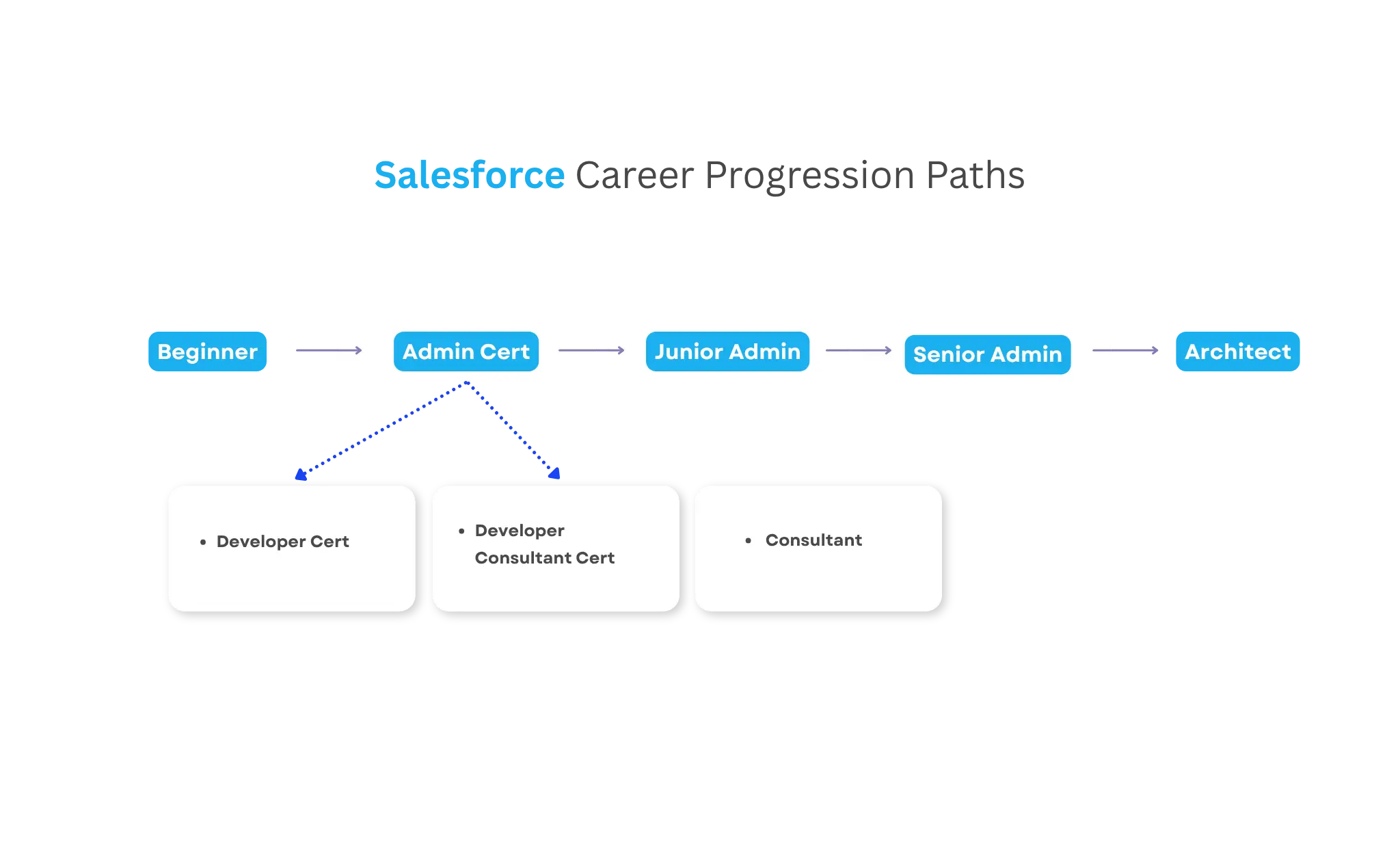
Career Progression Paths
Beginner → Admin Cert → Junior Admin → Senior Admin → Architect
After Admin Cert, you can also choose:
- Developer Cert → Developer
Consultant Cert → Consultant
8. Soft Skills That Help You Succeed
Technical knowledge is important, but soft skills also make a big difference in your Salesforce journey. Key soft skills include:
- Communication: Helps you work with developers, managers, and clients
- Empathy: Helps you understand user needs and create better solutions
- Teamwork: Makes collaboration easier and projects smoother
These people skills help you bridge the gap between tech and business. As a beginner, focusing on soft skills gives you a big advantage when working in teams or presenting ideas.
9. Different Salesforce Clouds: One Platform, Many Tools
Salesforce is not just one tool—it’s a collection of cloud-based products, each built for a specific need. Here are some of the key Salesforce Clouds:
- Sales Cloud: Helps sales teams track leads, close deals, and manage pipelines
- Service Cloud: Supports customer service teams with tools for solving cases
- Marketing Cloud: Lets marketers build campaigns across email, mobile, and more
- Commerce Cloud: Helps businesses run online stores
- Community Cloud: Builds custom portals for employees, partners, or customers
- Health Cloud: Used by healthcare providers to manage patient care
- Financial Services Cloud: Built for banks, insurance, and finance firms
- Einstein Analytics: Offers smart dashboards and predictions
- Salesforce Platform: A base where developers build custom apps
If you’re just starting, the Sales Cloud and Service Cloud are great places to begin. They teach the Salesforce terminology for beginners and introduce you to common workflows.
10. Technologies You’ll Want to Learn
To grow in Salesforce, it helps to learn some of the tech tools behind the scenes. Here are a few to explore:
- Apex: The coding language used in Salesforce
- Visualforce: A framework to build custom interfaces
- Lightning Web Components (LWC): Modern way to create app features
- SOQL: A language to search data in Salesforce
- Salesforce APIs: Help Salesforce connect with other systems
- AppExchange: A marketplace for third-party tools
Learning these tools gives you more control over your projects and helps you build custom solutions for real business needs.
11. The Salesforce Ecosystem: A Supportive Community
The Salesforce ecosystem is a global network that consists of more than simply software. Whether you’re looking for job advice, learning tips, or tech support, there’s someone ready to help. This community includes:
- Developers: Build custom features and apps
- Admins: Keep Salesforce running smoothly
- Partners: Help businesses with setup and consulting
- Trailblazers: Share knowledge and help others grow
- AppExchange: Offers tools that extend Salesforce
Getting involved with user groups or the Trailblazer Community can help you get started. It’s also a good place to practice the SFDC basics for beginners and meet other learners.
Future Trends in Salesforce
Salesforce is always improving. Here are some future trends to watch:
- AI Integration: Tools like Einstein GPT help automate tasks and predict customer behaviour
- Industry Solutions: More tools are being made for sectors like healthcare, finance, and education
- Automation and Analytics: Businesses are using Salesforce to speed up work and make smarter decisions
Keeping up with these trends can help you stay ahead and choose the right path for your career.
5 Mistakes Beginners Make
Avoid these common errors:
- Jumping into coding too fast → Master Admin skills first
- Ignoring updates → Check Release Notes every season
- Working alone → Ask for help in the Trailblazer Community
- Skipping soft skills → Communication matters
- Giving up too soon → Salesforce takes practice
Conclusion: Start Your Salesforce Journey Today
As you’ve seen in this guide, there are many ways to explore and grow with Salesforce. From training on Trailhead to networking at Dreamforce, the resources are all here.
Whether you’re looking to earn certifications, join the community, or find your place in the Salesforce ecosystem, now is a great time to begin. You can learn the basics of Salesforce, build strong soft skills, and stay up to date on trends that shape the future.
Start today, take that first Trailhead lesson, join a user group, or talk to a Trailblazer. The Salesforce world is ready to welcome you—and with each step, you’ll get closer to a rewarding and exciting career.

